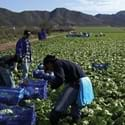Primaflor is an agri-business operating in Almeria, Spain, where it grows some 55 different vegetable varieties across some 4,300 hectares of land.
The company has selected Fatima Farm as its representative for the Flagship Farmers Program. The farm, which grows iceberg lettuce on more than half of its 212 hectares, has demonstrated how, by employing good practices in the use of water, agrochemicals and fertilizers, it is possible to develop a thriving farm even in an area of low rainfall.
Key areas of sustainable practice
The farm produces lettuce under the requirements of the GLOBALG.A.P. Assurance Scheme. This ensures that practices such as food safety/quality, good environmental management, record keeping and worker welfare are all independently audited and verified.
The farm is also accredited under SA8000, an international standard that guarantees good working conditions for all employees.
All planting areas are tested annually for nutrients, to prevent the over-application of fertilizers. Targeted fertilizer application plans are also implemented, which maximizes yields while minimizing nutrient losses.
The farm has introduced a number of measures to use water more efficiently:
- Soil meters monitor moisture levels allowing for accurate assessment of irrigation needs while also ensuring that water does not move beyond the plants’ root zone.
- Sub-surface drip irrigation minimizes the use of water by allowing it to drip slowly to the root zone of plants. It is estimated to be 25% more efficient than other methods of irrigation.
- A pressure compensated drip irrigation system is also in use, which is far more efficient and accurate than conventional drippers.
- All water sources have two microbial tests undertaken annually to ensure purity levels are met.
- A weather station on the farm predicts likely rainfall events and calculates soil evaporation rates.
The farm regularly plants native trees including olive, palm and carob.
A program of plant breeding, run in conjunction with seed suppliers, means over 300 different varieties are planted every week during the growing season, with the objectives of improving pest/ disease resistance and growth in future generations.
Primaflor also participates in Veg-i-Trade, a project that is assessing the anticipated impacts of climate change and globalization on safety issues concerning fresh produce and derived food products. This has included research on irrigation levels to evaluate their influence on product shelf life and quality for iceberg and romaine lettuce.
The farm employs an agronomy specialist to ensure accurate and timely diagnosis of pests, while biological repellents such as garlic extract and neem oil – which do not harm beneficial insects – are used to control certain target pest species.
The farm also works with plant protection product companies to develop more effective pest and disease control strategies.
The farm uses fertigation, which is the application of fertilizers or other water-soluble products through an irrigation system. This allows precise application and reduces the overall amount of chemicals that are used compared to dry application.
Primaflor also employs GPS systems to allow field shape and slope to be factored into field preparation. This optimizes the usable field area and improves the efficiency of cultivation, planting, irrigation and harvesting.
The use of mechanized planting, weeding and harvesting has improved plant establishment and, as a result, lettuce can now be harvested five days earlier. It has also helped the business reduce staff numbers by 32%.
Pheromone and sticky traps capture pest species, and if threshold levels are exceeded, then the farm’s technician can approve the use of specific plant protection products. The weather station predicts conditions that are likely to increase the risk of disease/pest incidence, so their use can be accurately targeted.
Learn more about Fatima Farm’s story
Explore the case study, where you’ll find extra details on how the farm has performed against the program’s good practice standards and criteria, what external research reveals about the producer’s actions and how improved sustainability benefits them.

“Being a Flagship Farmer makes us aware of the importance to establish Good Agriculture Practices and grow quality products in a sustainable and safe way to assure the future of agriculture. Only in this way we can gain the trust and confidence of our customers.”
“The amazing array of technology and good practices at play here show what is truly possible in the production of agricultural products. There are practices that have been put in place because they have an economic benefit, but what has also been considered is the beneficial impact that they have on the environment. Reducing the requirements of fertilizers, pesticides and water is one of the most important and pressing sustainability aspects of modern agriculture, and Primaflor have taken up this challenge.”


